- Home
- Upton Sinclair
Presidential Agent (The Lanny Budd Novels) Page 2
Presidential Agent (The Lanny Budd Novels) Read online
Page 2
“Yes, Lanny, of course. But can you not also have political opinions and exercise some influence on the side of humanity?”
“It would be difficult, almost impossible. Most of the persons for whom I buy pictures are conservative, not to say reactionary, in their opinions. I have met them because I move in my father’s world and my mother’s, and in neither of these would I be received unless I kept a discreet attitude on the questions which now inflame everyone’s mind. I don’t doubt that you know how the people of money and fashion abuse and defame Roosevelt.”
“He is trying to save them, and they will not have it.”
“Not under any circumstances. Every man of them is a Louis Seize and every woman a Marie Antoinette, hellbent for the chopping block. I made enemies by pointing this out to them, and now I have learned to let them do the talking and reply that I am a nonpolitical person, living in the world of art. They take that as my professional pose, and assume that I am after the money, like everybody else. You see I lead a sort of double life; I talk frankly only to half a dozen trusted friends. I’d like to have you as one of them, if you consent; but you must promise not to talk about me to anyone else.”
“I use many devices to keep my own name out of the papers, Lanny—so I can understand your attitude.”
“You surely will when I tell you that one of my best-paying clients is Hermann Wilhelm Göring.”
“Good grief, Lanny!”
“You may recall hearing me speak of my boyhood chum, Kurt Meissner, who became an artillery officer in the German Army. Now I am free to tell you something I was not free to mention at the time—that while I was serving as your secretary I ran into Kurt on the street in Paris; he was there as a secret agent of the German General Staff, and my mother and I sheltered him and saved him from the French police. Afterwards he lived in our home on the Riviera for a matter of eight years, and became a well-known pianist and composer. Then he went back to Germany and became a Nazi; through him I met many of those high in the Party, including the Führer, whose favorite Kurt still is. You see my position: I could tell my boyhood friend what I really think of his party and his cause, and thus break with him; or I could take the color of the Braune Haus and listen to what they told me, on the chance that what I learned might some day be of use outside. So I have played Beethoven for ‘Adi,’ as Hitler’s intimates call him, and General Göring finds me a gay companion, invites me to his hunting lodge, and pumps me for information about the outside world. I tell him what I am sure he already knows, and I market for him the pictures which he has stolen from the wealthy Jews of his Third Reich. My father goes in and leases his airplane patents to the fat Exzellenz, and they try their best to outwit each other, and laugh amiably when they fail. Geschäft ist Geschäft.”
“It is a terrible thing to be giving the Nazis the mastery of the air over Europe, Lanny.”
“Don’t think that I haven’t warned my father, and pleaded with him to change his business policy. But he answers that he went first to the British and the French, and they wouldn’t pay him enough to keep his plant running. ‘Am I to blame because it is the Nazis who have the brains and the foresight?’ he asks, and is too polite to add: ‘What business has an art expert trying to determine the destiny of nations?’ Robbie insists that he believes in freedom of trade, and quotes Andrew Undershaft on ‘The True Faith of an Armorer.’ But, alas, when I put this creed to the test, it didn’t stand up. My father would not, either directly or indirectly, permit the democratically elected people’s government of Spain to purchase a Budd-Erling P9—not for cash on the barrelhead.”
“You know Spain, Lanny?”
“Not so well as I know France and Germany and England, but I have visited it three times in the past year. Each time I brought out paintings, but also I met and talked with all sorts of people, and kept my eyes open. I saw the putting down of the Franco uprising in Barcelona and the arrival of the International Brigade for the defense of Madrid.”
“What do you think will be the outcome of that fight?”
“The people will certainly be crushed if we continue our refusal to let them buy arms, while at the same time we permit the Italians and the Germans to send Franco everything he asks for. I cannot understand our country’s diplomacy, and I wish that you would tell me: Why is it, and what does it mean?”
“The answer is not simple. There are so many forces, some pulling one way and some another.”
“But the President himself, Professor Alston! He is the head of the government and is responsible for its policies. Can he not see what he is doing to Europe when he permits the Nazis and the Fascists to combine and murder a democratically chosen people’s government?”
“The President is not the ruler of Europe, Lanny.”
“No, but he is the head of our State Department, or ought to be, and has the say about our foreign policy. Why has he reversed what has been international law since the beginning; that any legitimate government has the right to purchase arms for its own defense? Why did he go to Congress and demand that the arms embargo be extended to apply to the Spanish Civil War? Why does he go on supporting the farce of Non-Intervention after he has had a whole year to see what it means—that we keep faith with Hitler and Mussolini while they keep faith with nobody in the world?”
VII
The ex-geographer was gazing into a pair of earnest brown eyes and listening to a voice that was always well modulated, even when it was full of concern. They seemed to him young eyes and a young voice; the same as he had observed them in the conference rooms of the Hotel Crillon, where the grandson of Budd Gunmakers had labored so hard to save the district of Stubendorf, the home of his friend Kurt Meissner, from being turned over to the Poles. Now here was this Lanny in the summer of 1937, nearly twice as old, but still stating a complex problem in simple terms. Or, at least, so it seemed to a “fixer” of high state affairs. Why doesn’t President Roosevelt see this? Why doesn’t he do that? A fixer hears such questions all day and most of the night; and perhaps he doesn’t know the answer, or perhaps he’s not free to tell it.
Alston listened until this friend had finished pouring out his demands; then, after a moment’s pause, and with a trace of a smile, he said: “Why don’t you ask him yourself, Lanny?”
“I have never had that opportunity, Professor.”
“You could have it quite easily, if you wished.”
The younger man was startled. “You think he’d have time to talk to me?”
“He is a great talker; he loves it. Also, he likes to meet people, all sorts—even those who disagree with him.”
“I hadn’t thought of the idea,” said Lanny; but he was thinking now while he spoke. “It would be a great honor, I know; but I might get into the newspapers—and then what would Robbie say?”
He stopped, and the other laughed. “You might go to sell him a picture. He might really buy one, to make it all right!” Then, more seriously, he explained that the President was at Krum Elbow, his mother’s Hyde Park home, which was not so closely watched by the news-hounds. “They make their headquarters in Poughkeepsie, some distance from the estate, and they don’t haunt the grounds as they do the White House. The President could easily instruct his secretary that your name was not to be included among the daily list of visitors. That might be of advantage to him, also—for it’s possible that he might have something confidential to say to a friend of Hitler and Göring.”
VIII
It doesn’t take long to arrange an appointment when the telephone service is working—and when you are the right person. Early next afternoon Lanny left his hotel, driving a sport car which was at his disposal whenever he visited his father’s home in Connecticut. His route took him through Central Park and up Riverside Drive; across a great tall bridge from which he had a breathtaking view; then up the valley of the Hudson River, known to history and legend. Here Major André had been hanged and General Arnold had fled to avoid hanging; here mysterious Dutch figures had p
layed at bowls in the night, thus causing the thunder, and Rip van Winkle had anticipated Freud with his “flight from reality.”
The Dutch settlers had moved up this broad valley and with bright cloth and glass beads and other treasures had purchased large tracts from the Indians. Wars and revolutions had left them undisturbed, and now their tenth generation descendants were gentlemen farmers, living in dignified leisure and voting the Republican ticket. Once in a while comes a black sheep to every fold, and so in this staid Dutchess County was a family of Democratic Roosevelts whom their relatives and neighbors looked upon with horror, referring to the head of it as “That Man.” The Nazis had changed his name to Rosenfeld and said he was a Jew; millions of worthy Germans believed it, and Herr Doktor Josef Goebbels, who had started the story, had chuckled over it to Lanny Budd.
A well-paved boulevard winds along the edge of the hills, now losing sight of the river and then coming again upon a sweeping view. Every few miles is a village, with houses surrounded by lawns and shaded by ancient trees. Cars are parked in front of general stores, and loungers sit in front of them, chewing cigar stubs, whittling sticks, discussing their neighbors and the doings of their politicians. In the heat of a midsummer afternoon everything is still that can be; only the bees hum, and the motor of a car speeding along the highway at the customary rate of ten miles faster than the law allows.
When Lanny neared the little village called Hyde Park, he found that he was ahead of time, and stopped for a while in a shady spot and waited, going over in his mind for the tenth time what he was going to say to the man who held the destiny of the Spanish democracy in his hands. Would this busy man give him time to say it all? On chance that he wouldn’t, what was the first thing to make sure of? Ever since the spring of 1919 Lanny Budd had been trying to change the history of the world—off and on, of course, and in between playing the piano, looking at paintings, and making himself agreeable to the smart friends of his mother and father.
IX
The old Dutch farms run from the highway to the bluffs which confine the river, a distance which may be half a mile or more. Each has its own gates and perhaps a porter’s lodge. Lanny drove slowly until he came to gates having a sentry-box with two State troopers on guard. He stopped and gave his name to one who came forward; the man nodded, and Lanny drove on, up a long treeshaded avenue, like a thousand other approaches to mansions that he had visited in the course of his playboy life. This mansion was modest, according to playboy standards: a two-story structure which had been lived in and added to; part frame and part stucco, with towers; the sort of house which really rich people discard as no longer big or elegant enough.
Lanny parked his car in a shady spot on the circular drive. A colored butler opened the door before he rang, and a woman secretary came to meet him in the entrance hall. When he gave his name she led him without delay along the hall and down half a dozen stairs having a ramp alongside. These gave into the library, a spacious room which appeared comfortable and much used. The books were mostly legislative reports; there was a Winged Victory in marble against one of the walls, a model of a ship under glass, and a lady’s sewing-bag hanging over the back of one of the overstuffed chairs. These details Lanny Budd took in with swift and practiced eyes. Then he saw a large flat-topped desk near the fireplace, and seated at it, facing him—That Man!
A large man with a large head, powerful shoulders and arms, wearing a white pongee shirt open at the throat. In his middle years he had been stricken with the dread disease called poliomyelitis, and as a result his legs were shrunken; he had to wear braces, and in public you observed him leaning upon the arm of a strong companion. In his home he used a wheelchair, which was the meaning of the ramp leading into the library. Such a stroke would have crushed most men; but one who had the courage to defy his fate, the power of will to persist and train his shrunken muscles all over again—such a man might come out of the ordeal stronger and more self-possessed. Many persons had doubted whether it could be possible for a man so handicapped to stand the strain which the office of President inflicts upon its victims, but F.D.R. had managed to enjoy the job. He was blessed with a buoyant disposition and could make jokes, look at movies or postage stamps, and not lie awake at night trying to solve problems of state.
He was seated in a large leather chair, and offered a cordial hand and welcoming smile. Lanny was to be exposed to the famous “Roosevelt charm,” and had wondered: “What will it do to me?” He had encountered various kinds of charm on the old continent where he had been raised; many kinds false, some dangerous, and he had learned to distinguish among them. He saw at once that here was a man genuinely interested in human beings and in what they had to bring him. On his desk within close reach was a stack of reports and documents a foot high. These would be hard going; but when somebody like the grandson of Budd’s came along, having traveled all over the cultured world and met its élite—someone who shared F.D.’s own joy of living and his; prejudice in favor of the “forgotten man”—then his face lighted up and his eyes sparkled and it was as if he had had a glass or two of champagne. “You two are made for each other”—so Alston had said to each.
X
They talked about the ex-geographer; the President said that he had found him a highly useful man, and Lanny replied: “I made that discovery when I was still in my teens.” He described himself, a youngster who hadn’t even finished prep school, plunged suddenly into the caldron of old Europe’s hottest hatreds. Everybody connected with the American peace delegation, even a secretary-translator, had been pulled and hauled this way and that by national interests, racial interests, business interests. With his father’s help Lanny had come to recognize the real forces behind that conference: the great cartels which controlled steel and coal and shipping and banking and above all munitions throughout Europe; which owned newspapers in the various capitals, subsidized political agents, and moved governments about as their pawns. Stinnes and Thyssen in Germany, Schneider and the de Wendels in France, Deterding in Holland, Zaharoff in all countries from Greece to Britain—these were the men who had had their way, and had broken the heart of Woodrow Wilson.
Zaharoff, munitions king and “mystery man of Europe,” had been no mystery to Lanny. He told how this Knight Commander of the Bath and Grand Officer of the Legion of Honor had tried to buy a young American secretary, offering him the most tempting of bribes to betray his trust and reveal the secrets of the peacemakers. Later, not being entirely pleased with the treaties, Zaharoff had subsidized a private war of the Greek nation against the Turks. Lanny told how, with the help of Robbie Budd, he had tried to buy the Bolsheviks at the Genoa Conference; and how, in Lanny’s presence, he had burned his diaries and private papers and thus set fire to the chimney of his Paris mansion. When his beloved wife had died, this munitions king of Europe had taken to hiring spiritualist mediums. Lanny had brought him one, but the séance had produced, instead of the hoped-for wife, a horde of soldiers shouting vilifications. Among them had been one who proclaimed himself the Unknown Soldier, buried under the Arc de Triomphe. He had declared himself a Jew—something which would surely have distressed the anti-Semitic military cliques of France.
A President who had distressed the numerous anti-Semitic cliques of his own country listened with manifest pleasure and remarked: “These are tales out of the Arabian Nights. I command you to come and tell me a thousand and one of them.”
“Under penalty of having my head chopped off?” asked the visitor, and they chuckled together.
XI
One who had studied the social arts in France would not make the mistake of doing all the talking. Franklin D. Roosevelt had had his own Arabian Nights’ adventures, and Lanny let him tell them. “We have our masters of money on this side of the water, too,” he said. “They know just what they want, and are greatly shocked because they cannot get it from me. They were not entirely without influence in the previous administration, as you no doubt know.”
“Ind
eed yes, Mr. President.”
“You would be amused to hear of the efforts they made to trap me, after I was elected and before I was inaugurated. The country was in the midst of a panic, and if only I would consent to meet with Mr. Hoover and give him some idea of what I wanted done! The scheme was, of course, that I should be assuming responsibility, taking the panic over as my panic instead of my predecessor’s. I let him have it all, up to the very last moment.”
“It took nerve, and I admired yours.”
“You can’t imagine the pressure; it never let up, and hasn’t let up yet. They persuaded me into a World Economic Conference in London right after the inauguration, if you remember, the idea being to preserve the gold standard and fix all currencies at the then-existing levels. France and Britain had devalued their currencies and wanted to keep the dollar at the old level, so they could take over the trade of the world. When I realized what it was all about I dumped the chess-board, and I don’t expect ever to be forgiven for it. You doubtless know the sort of stories they tell about me.”
“I have had them straight from the horse’s mouth.”
“I am supposed to be drunk all the time, and in spite of my physical deficiencies I maintain a large harem.”
“Have you heard the one about the psychiatrist who died and went to heaven and was invited to psychoanalyze God?”
“No. Has that something to do with me?”
“St. Peter explained that God was suffering from delusions of grandeur—He thought He was Franklin D. Roosevelt.”
The President threw back his head and laughed heartily; he put his soul into his enjoyment of a joke, and it was a good thing to hear. Lanny remembered that Abraham Lincoln had sought the same kind of relief from too many burdens.

 Prince Hagen
Prince Hagen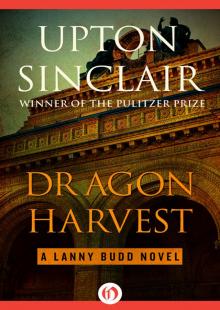 Dragon Harvest
Dragon Harvest The Jungle
The Jungle Sylvia's Marriage
Sylvia's Marriage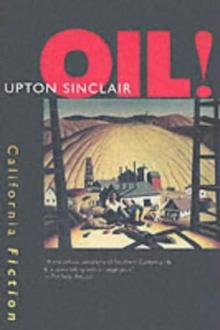 Oil! A Novel by Upton Sinclair
Oil! A Novel by Upton Sinclair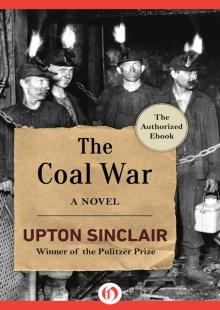 The Coal War: A Novel
The Coal War: A Novel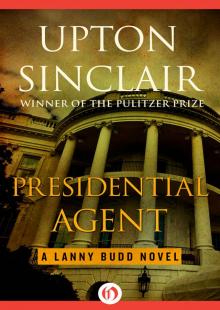 Presidential Agent
Presidential Agent World's End
World's End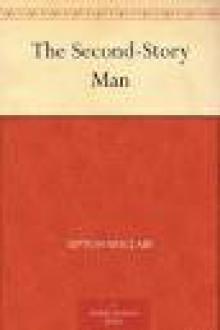 The Second-Story Man
The Second-Story Man O Shepherd, Speak!
O Shepherd, Speak!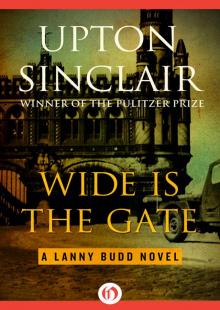 Wide Is the Gate
Wide Is the Gate The Return of Lanny Budd
The Return of Lanny Budd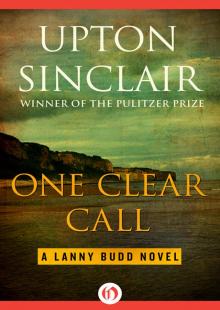 One Clear Call I
One Clear Call I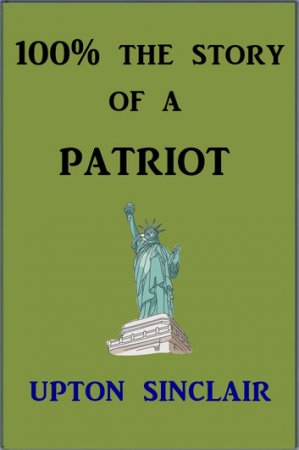 100%: the Story of a Patriot
100%: the Story of a Patriot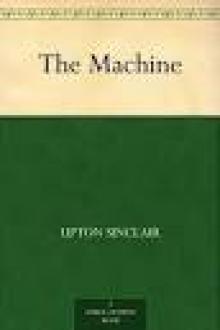 The Machine
The Machine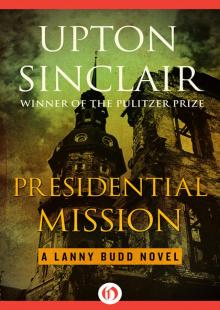 Presidential Mission
Presidential Mission A Cadet's Honor: Mark Mallory's Heroism
A Cadet's Honor: Mark Mallory's Heroism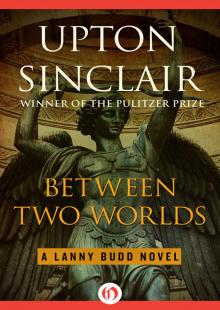 Between Two Worlds
Between Two Worlds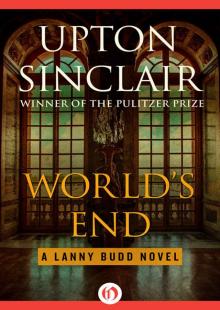 World's End (The Lanny Budd Novels)
World's End (The Lanny Budd Novels)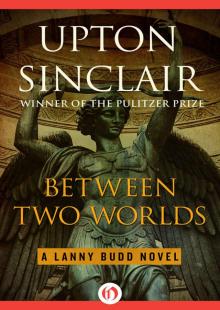 Between Two Worlds (The Lanny Budd Novels)
Between Two Worlds (The Lanny Budd Novels)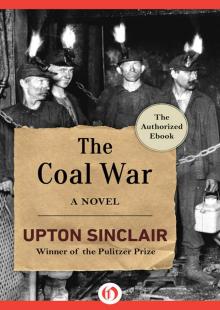 The Coal War
The Coal War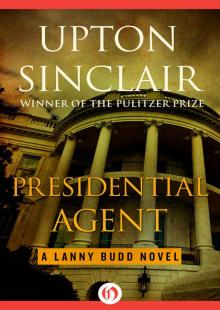 Presidential Agent (The Lanny Budd Novels)
Presidential Agent (The Lanny Budd Novels)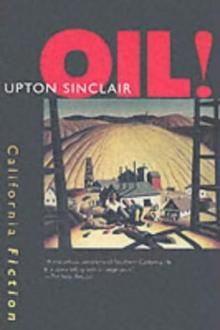 Oil (filmed as There Will Be Blood)
Oil (filmed as There Will Be Blood)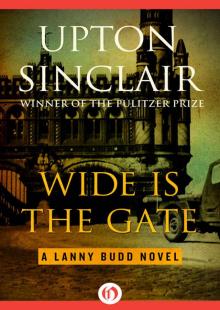 Wide Is the Gate (The Lanny Budd Novels)
Wide Is the Gate (The Lanny Budd Novels)